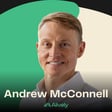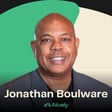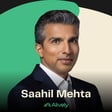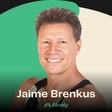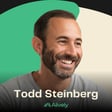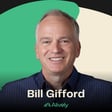Living Authentically: Eliminating 'Should' from Our Lives
00:00:00
Speaker
I should work out more. I should make more money. i should have a six pack. I should eat more salads. I should do the things that Mike told me to do on this podcast. Like those are all external aspects that we put on ourselves, expectations.
00:00:14
Speaker
And so we can feel weighted down by those and it can quiet our ability to hear what our own truth is. And now we're living in an external world versus an
Introduction to Home of Healthspan and Guest Mike
00:00:23
Speaker
internal world. My goal for anyone listening is to never ever utter the word should again.
00:00:31
Speaker
This is the Home of Health Spam podcast, where we profile health and wellness role models, sharing their stories and the tools, practices, and routines they use to live a lively life.
00:00:45
Speaker
Mike, it is so great to see you. how are you doing today? I'm doing well, Andrew. Yeah, thanks so much for having me on. ah Taylor and I are very excited to speak with you. You, i have to say, of all the guests that we've had so far, your content, the one I share the most with people, everybody in the gym, I'm like, oh, you got to see this guy I'm talking to. You got to see some of the stuff he does.
00:01:06
Speaker
And I know we were just saying before, you've changed some of the the reels you penned.
Exploring Unique Lifts and Overcoming Limitations
00:01:11
Speaker
on Instagram, but can you talk about some of the the feats of strength, the the single arm overhead squats and and other things?
00:01:19
Speaker
How did you get into that as, Hey, I want to be the best of the world at these pretty incredible things. Yeah. Well, thanks so much for, uh, for following along on on those lifts.
00:01:30
Speaker
I, I'm really curious in the gym. And so I like kind of exploring new ways of training and I'm really good at keeping my arms straight, probably from a lot of yoga that I used to do and teach in my past um and a lot of strength and conditioning, Olympic weightlifting.
00:01:46
Speaker
So now I like to just experiment and and learn different types of lifts and then see kind of how I can push them. And it feels like a big puzzle for me. So like the one arm overhead squat,
00:01:59
Speaker
There's like where are you getting your hand on the bar? I mean, these are like pointless type of exercises, but they're really fun and in terms of how they engage my body, my mind, my focus, keep me inspired to like be in be inside the gym.
00:02:12
Speaker
So it's, you know, where am I placing my hand on the bar? um can I break through like perceived limitations?
Finding Enjoyment in Fitness Routines
00:02:19
Speaker
I mean, the first time I did, it I think I held like 135 over my head and i was like, holy cow, like, you know, 45 on each side, hold over my hand. The squat was pretty easy for me.
00:02:30
Speaker
And then i'm like, all right, let's see, maybe 185 for 200 pounds, my body weight 205. And then every time I would come back to these lifts, it would just improve a little bit. I kind of learned something more. My body would kind of figure it out.
00:02:44
Speaker
And then I wind up with my personal best is three 15 one arm overhead squatting. And so that's been yeah fun adventure to to kind of move through. I haven't done it since.
00:02:57
Speaker
and But I felt like the squat was really the limiting factor for me there. You bring up what I think is an important point for listeners in in that you do it not for the specific test, but because of the puzzle, it's what makes it more enjoyable for you. So a lot of people say, oh, yeah, I i don't like working out.
00:03:16
Speaker
And for them, it was all they ever tried was running. And what they really are saying is I don't like running or running. There are infinite different opportunities to move your body and finding something that stimulates that curiosity, that excitement, that enjoyment for you is what keeps you going back.
00:03:38
Speaker
Can you share like what is it you're working on these days? is there one that you're going to land with?
Transitioning from Strength to Endurance Sports
00:03:44
Speaker
I mean, you nailed it. It's really like, I'm sure maybe previous guests have talked about flow state before and kind of seeing, you know, where's the challenge meet the skill. So like the skills that you have, can you match an appropriate challenge for those skills and then be completely dialed in and focus on that zone where you're, you know, just locked into whatever it is that you're doing.
00:04:06
Speaker
And for me now it's actually running. Funny that you mentioned that. Like I, you know, like to do these lifts. There's one called the two arm, two hands anyhow, which is like an old lift from the bronze era of strength and conditioning, like in the early 1900s, where it was kind of like, you see those like circus kind of pictures of guys like doing like these weird lifts and holding kettlebells. And um they would travel around from town to town in Europe. And I think a little bit in the United States, but was more popular in Europe.
00:04:33
Speaker
And they would just, you know, go out into the open square and challenge people to say, Hey, can you, let's see the heaviest two implements you can lift over your head. And there's different ways of lifting those up. And, you know, today,
Endurance Training and Personal Limits
00:04:44
Speaker
maybe in the gym, guys are like, what's, what's your bench or where do you squat? And they're always like kind of comparing.
00:04:49
Speaker
um And so for that specific lift, it's um what I do is I clean and jerk. And then I move one hand over to the middle, get that balance and then squat down and pick up a kettlebell and lift that overhead.
00:05:02
Speaker
um And so I haven't done that one in a while. to answer your question, what I'm working on now is is running and um actually like ultra distance running and biking, mountain biking. So i'm doing a challenge called the Lead Challenge, um which is in Leadville, Colorado.
00:05:17
Speaker
um There's famous trail run and mountain bike, the Leadville one hundreds um But Leadville big challenge. as a town Kind of like that there was a mine there that closed down in the early 1800s and the town went broke. Everyone you know was working at the mine and didn't have a job. And so this guy, Ken Kubler at the time, well, not at the time, it's so he's still there. He kind of came up with this idea to bring revenue and and money into the town. It was like, let's do a hundred mile mountain race across these humongous peaks um in Colorado and it caught on. And, you know, that was 41 years ago. This would be the 41st year.
00:05:55
Speaker
It'll be the 30th year of the mountain bike and lifetime fitness, like the big gym conglomerate actually bought the trail, they bought the races and they put on like a marathon, 50 mile trail run and bike, a 10 K and then the two hundreds.
00:06:12
Speaker
And if you do all five of those and this year it's like in six weeks, seven weeks, you, it's called the lead challenge. And so that's what I'm training for this summer to do the the trail marathon at the end of June.
00:06:25
Speaker
Then the next weekend is actually the 50 mile trail run on Saturday, 50 mile bike on Sunday. And then like a month later is the hundred mile mountain bike ride, 10 K the next morning.
00:06:36
Speaker
And then five days later is the hundred mile trail run.
The Role of Community in Fitness Journeys
00:06:39
Speaker
Oh, you're going to close it with a hundred mile trail run. because it's three That's a, One of the toughest ones, my my roommate from law school did the run and talked about hallucinating multiple times during it. He thought he was riding a camel at times. He just wanted to lay down and cover himself with leaves.
00:06:57
Speaker
mean, it's a it's crazy just to do that one and to combine all that in a very short period. i It's amazing how varied that is. You talked about teaching yoga into...
00:07:09
Speaker
these old school like feats of strength into very high endurance. Like the marathon is one of the shorter pieces of the things that you're about to to go tackle.
00:07:21
Speaker
What was it that inspired you to move from traditional strength into let's let's try the endurance thing as my my next personal challenge? Yeah, i never had really focused on my like aerobic system before.
Performance Mindset Coaching: Beyond Physical Fitness
00:07:33
Speaker
And i have a lot of friends. I live in Boulder, Colorado.
00:07:36
Speaker
And so there's A lot of people like in my circles that have done a lot of more aerobic stuff or triathlons or Ironmans or those types of things. And we're always talking about like zone two aerobic training.
00:07:47
Speaker
And I had never focused on that. You know, when I was 18, I was a quarterback and corner in high school playing football. And I went to college and put me a middle linebacker.
00:07:58
Speaker
And so I was like, you know, 190 and I'm and i'm six one And I was like, I'm looking at the roster of all these guys. I'm like, I'm going to get hammered. And so my senior year, I learned actually how to Olympic weightlift from this Russian coach where I grew up. And I gained like 40 pounds in like four months, just like lifting and eating like crazy.
00:08:19
Speaker
um But then that, yeah, it kind of put me on that trajectory of, of of lifting. And so I focused my early years on lifting, whereas some of my buddies had focused their early years on this aerobic training.
00:08:32
Speaker
And so in my mind, i was like, okay, that makes sense. um ah Let me start running, start practicing this lower heart rate stuff. I'm an infant in that because I've never done it before. And so it kind of took all away some pressure of trying to be successful or
Physical Challenges: Boosting Self-Worth and Self-Love
00:08:46
Speaker
comparing myself to either some strength lifts or to other people.
00:08:50
Speaker
I could just like be in my own experience. How has like your training shifted? Like knowing i kind of had a similar experience being like a jumper and sprinter in college and like the transition from like fast twitch muscle development to slow twitch muscle development for endurance running is very different. Like, have you noticed any physique changes and like in terms of training, like have you had to lower your lifting load? Yeah.
00:09:17
Speaker
Yeah, definitely. I mean, my first aerobic runs were like 15 minute miles. Like I was flat. Like I was, it was the hardest on the ego, honestly, because i felt like I was athletic. I would just like set some records and like Turkish getups and different types of movements.
00:09:33
Speaker
But then I'm running 15 minute miles and my heart rate flies up. And so that was the most difficult important part, but Also, it could just i could see improvement because the next run was 1430 and then 14 and then jumped to 12. And that kept me motivated because I could see those incremental gains and I can still see them now. And so it's really fun to be able to you know stay motivated in that way where you put in the work, maybe you drop some weight, maybe you lose some of your overall strength, but you gain some of this other ability. And at the moment, that's really what I'm into.
Basics of Recovery: Sleep, Hydration, and Gadgets
00:10:08
Speaker
And how do you track, like what do you use to track your heart rate? Like, do you have a watch that you use? you wear like a heart rate monitor or anything? Like I know I'll run and like only look at the zones that I'm running in. So I'm not focused on the pace when I'm zone training.
00:10:22
Speaker
Yeah. so i have a Garmin. I'm actually sponsored by Garmin. I highly recommend Garmin. i love them. This is an Epix Pro 2, their new generation. And then I also wear a heart rate strap um just because the technology on any wrist-based heart rate is not there to be as accurate as possible. So I always stay strapped with my heart rate monitor. And then, yeah, depending on what the goal of the session is, i can just kind of put on the watch face, what is it that I want to see? So I usually like like overall time, my heart rate, pace, average pace.
00:10:58
Speaker
And then I just... stay as disciplined as I can in on the heart rate, which I kind of read somewhere that if you jump out of your zone to you jump up into tempo or a higher zone for too long, it's kind of like your body like opens up the lactate flushes into your system and then it's hard to clear it.
00:11:17
Speaker
And not like necessarily you lose the benefits, but you don't get as many. And I wanted to get as many as I could as fast
Technology in Training: Precision and Comfort
00:11:24
Speaker
as possible. So I was like, Once it hits you know even like a few beats before my top, I'm walking or I'm slowing down.
00:11:31
Speaker
That's switching the discipline right to to be able to break through new personal bests. At a certain point... If you just stick with the same thing, you're just trying to hold on to what you already had or trying to get worse more slowly.
00:11:47
Speaker
like As a former swimmer, or Taylor was a former runner, it'd be very hard to compete with the times we went into college. and so if we just If that's what we had, then it would just be tapering down. Whereas switching from football to weights to running, you can go into something. You were just talking about your trajectory of 15-minute miles to 14.5 to 14 to 12, that you can see the progress that keeps the motivation.
00:12:12
Speaker
Coming from, you you think of a traditional long, long distance runner, very slight frame, very small, um and thus the impact on ankles, knees, the the stuff that they're having to carry through that is very different.
00:12:24
Speaker
You're coming from very heavy weightlifting, different physique. Have you been playing at all with like the shoes you wear, the equipment? Because I imagine that's going to be a pretty important part of making it sustainable to to do some of this stuff.
00:12:39
Speaker
Yeah, definitely. I mean, I'll talk about the shoes in a second, but just understanding like if you have a, I have a strength background, so my body's strong, but it hasn't taken
Enhancing Performance: Training Methods and Gear
00:12:50
Speaker
all that impact. And so learning like this skill of running is similar as like the skill of a Turkish getup or the skill of like partner acrobatics used to do a lot of that, like the skill of a handstand.
00:13:02
Speaker
And so there's skill with running. It's not just like putting one foot in front of the other, as I'm sure you guys both know. And, you know, same thing with biking, like how to pedal the bike. Like I always used to just bi oh just go ride my bike.
00:13:15
Speaker
But there's, you know, especially mountain biking, there's cornering, there's like downhills, there's climbing, there's body position, there's foot strikes, there's all this different stuff. And so the more nuanced I can get with it, the more engaged I can stay mentally.
00:13:29
Speaker
um But in terms of what I was getting to with the running is that like, if I'm running downhill, where my foot striking the ground is going to be important over time. If I'm doing, you know, 50 80 mile weeks, like up in the mountains, like it's a lot of impact because I'm two 15, like I'm putting that pounding down on my body. So my favorite shoes, like,
00:13:51
Speaker
are Speedland. They're like a newer shoe. um They're made specifically for mountain running. um Yeah, they're fantastic. They're the only shoe that I would really like to run in.
00:14:02
Speaker
They're coming out with some new models and they're they're doing really well. They're a higher end shoe for sure. They're They're pretty pricey, but the founders of them, I think came from Puma and Under Armour and said, we just want to make highest end trail running
Nutrition and Hydration for Endurance Sports
00:14:18
Speaker
And it's just going to cost what it costs. But this is, if you want the the best, you want the shoe that's going to last you the longest. This is the shoe for you. It's got a boa system on it, which is like those cranks that you spin and they click.
00:14:31
Speaker
A lot of biking shoes will have that as well. Yeah. And so it's helped like dial in the fit. You can back it out. Like I just got back from a trail run and on the way up, I was like, my foot was swelling a little bit. So I'll dial the back real fast. And then on the way down, I tightened it up.
00:14:47
Speaker
And so that's a nice feature. But my favorite feature from them is the durability. Like I'm putting so much pounding on that shoe that when I used to use like Hoka as example, I would run through that shoe like 250 to 300 miles Whereas the speed lands, I can almost double that.
00:15:04
Speaker
And so if you put that with the cost, you it's like, oh, it's actually, you know, a better value. Yeah, that's that total cost of ownership is the right way to think about it. Right. It's not apples to apples otherwise.
00:15:18
Speaker
Yeah. In terms of like recovery and stuff, have you had to change any protocols, like knowing going from lifting and now into this like running and cycling routine? Have you had to change like your diet? Have you had to change your supplements? Have you purchased any new like gadgets or gear to help you? And especially knowing you're going to be doing so much in a short period of time.
00:15:43
Speaker
Yeah, no, totally. It's, um, I try to get really good at the basics and those are, it's hard to do that. Like sleep, hydration, making sure I'm eating well.
00:15:54
Speaker
Um, and those are the things that are like highest on the list for me. And then, you know, have a sauna, like, um, a Sisu sauna, which I love.
Ensuring Quality Sleep: Routines and Environment
00:16:02
Speaker
Um, and so that's like a luxury that can get in that almost every day.
00:16:06
Speaker
ah have an edge theory cold tub that I get into. So i like to do contrast therapy going back and forth with the sauna and the cold tub. Um, but making sure I'm, I'm in bed for like, depending on how hard the session is, like anywhere from 10 to nine hours.
00:16:22
Speaker
Like I use my watch again, it gives me a sleep score. So it tells me like how much REM sleep I'm getting, how much total sleep, how much light sleep, all this stuff. And it gives you one to a hundred last night I got a 94. So I saw that I was like, yes, that's awesome.
00:16:36
Speaker
Um, but you know, making sure that, even like before I'm sleeping, I'm winding down, um, getting off screens as much as possible. I don't have a problem getting really to sleep, but, um,
00:16:51
Speaker
you know I don't drink any alcohol. That's another thing that will really affect sleep. I actually have a long history with sleep and a sleeping disorder. um And so I'm just wanting to make sure that that's
Balancing Family Life and Training
00:17:03
Speaker
sick. Because if I get six hours, like I'm probably not even going train because I'm stressing my body with not getting enough rest.
00:17:11
Speaker
I don't want to add in another stress of training. I'll just tweak the... the weekly schedule. You talked about the the prep kind of winding down. What does that routine look like? Like at what time do you start that? And are there certain steps that you go through? Do you do the the contrast within a certain time of bed? And kind of what does that nighttime routine look like?
00:17:35
Speaker
Yeah, I mean, in an ideal world, i live with an eight-year-old and an eight-year-old boy. So like it's nice because he kind of gets to bed earlier. and so he has a wind-down time where we're reading. he's It's quiet. He's in his room. It's like eight o'clock.
00:17:50
Speaker
And so I can just kind of carry that energy over to me. And then I can get into bed you know when there's a nine on the clock. Yeah. You know, sauna and cold plunge before sleep is fantastic. I've been experimenting with tart cherry juice recently, um which so far have you know some positive benefits from.
00:18:11
Speaker
But yeah, keeping the room cold, keeping it dark. Those are all really helpful things. Do you wear an eye mask or you just have like blackout curtains or whatever it is to keep the room itself dark?
00:18:22
Speaker
I need to get another set of eye mask. I have curtains that are dark, but there's seemingly no matter how much I try to do it, there's always a little sliver that just comes in and hits my
Recovery Aids: Electrolytes and Routines
00:18:33
Speaker
skin. And I did a holistic lifestyle training with Paul Cech like 10 plus years ago.
00:18:38
Speaker
And he he says like, you know, the eyes are good. You don't want any light coming in the eyes, but your skin receives so much of that light that even if there's light hitting your foot, if your foot's out of the bed or your arm, it still triggers that um physiological response that, oh, there's light, this is daytime and it kind of can affect the sleep.
00:18:58
Speaker
So I try to think of it like um a cave mode. but Like I just want it to be dark and cold and it is sleep. And then I can get out and I can go get up and do my day. So getting 10 hours or nine, does you, you mentioned you live with a eight year old. Does the eight year old let you not get up before seven so you can get that 10 hours or what does that Yeah. I mean, he he'll sleep for sure. i He's out of school now.
00:19:24
Speaker
So that's, that's great. So we're getting more sleep, but actually ah I have a puppy too. So I have a young puppy and it's making sure she's getting a lot of exercise and kind of like staying awake before we get to bed.
Mindset for Personal Growth: Fixed vs. Growth
00:19:39
Speaker
If I get to bed and she's kind of just been like, you know, resting or sleeping for those two hours as putting down Remy, then she's going to wake up at five o'clock, six o'clock in the morning.
00:19:51
Speaker
And then that's going to affect, you know, she's up. She's going to let all of us get up too. You mentioned hydration. Is that, and I'm thinking the the amount you're,
00:20:03
Speaker
exerting. Is that just water? do you think about the electrolyte load that you're taking in to to make sure you're truly hydrated? Or are there other kind of supplements you think about that you've seen help hinder your sleep other than the the tart cherry juice?
00:20:18
Speaker
Yeah, I um definitely take electrolytes usually before I'm either doing a sauna or some type of exercise. And then like generally throughout the day, i like Element.
00:20:29
Speaker
I have you know a bunch of the sticks that I'll use. I find that to be the best for me. I've tried lots of other brands, but um that can you know kind of keep me feeling my best for sure.
00:20:41
Speaker
um Otherwise, for sleep, I've experimented with like a lot of different things, but nothing is... Nothing super solid. Like beam was one that I love. It tastes really good before you go into bed.
00:20:53
Speaker
um has mellow. I think it has melatonin in it, but I don't really have an issue getting to sleep. So as long as my schedule kind of aligns and I can prioritize like that, getting into bed at that certain time, once my head hits the pillow and I decide it's time to go to bed,
00:21:10
Speaker
um usually I'm usually out. That's a good point on the kind of macros versus the micros and identifying, hey, my macros are sleep and hydration, nutrition, right? Like I need to get those before I start worrying about the molecules to come in. And for you, i mean, if if you're nailing those macros, you almost don't need they're nice to have maybe on the micros, but not not a essential.
Stress Management Techniques: Breathwork and Focus
00:21:32
Speaker
Yeah, definitely. I mean, I work as a performance mindset coach. And so it's a lot of value work I do with people seeing like, what's the most important thing for you? And then what are the actions that are going to elicit those feelings or those experiences and trying to niche it down? So it's not like this is my morning routine of like 5000 things. It's like they are the actions that we can take and they're going to get you're to get the most bang from your buck for doing X.
00:21:59
Speaker
Like one example I will give a lot is working out. Like if your gym is 15 minutes away and you're not training with anyone, you're just by yourself with headphones kind of going through some machines and and you work out for an hour, that's 90 minutes of your day that you're doing alone, inside, maybe not following a program, not maybe getting the most bang for your buck in terms of time.
00:22:23
Speaker
If like community is a value of yours or nature or adventure, um there's, you know, and ways to kind of tweak, like maybe what gym you go to or where it is or how you think about your goals or your training program that can really change how you overall feel about your life.
00:22:42
Speaker
Yeah, I mean, I'd love to talk more about that. i think there's plenty that people would think from the first part of this conversation that it's all fitness, all fitness, all these things. But actually, professionally, you're ah mindset coach. You're performance coach.
00:22:56
Speaker
And can you say how you got into that? but To me, mindset is the foundation of everything else because we get the right mindset.
Achieving Flow State in Various Activities
00:23:05
Speaker
We prioritize sleep. We can motivate to get to the gym. We can do this other stuff.
00:23:10
Speaker
How did you come to this being your profession? Yeah, I started off, I mean, I've always been a coach to a certain degree, and I started doing strength and conditioning, and I was pretty lucky. The New York Jets came to my college in upstate New York for their training camp in the summertime, and I interned for them the first year. I was working with them again the second year and was able to work with some of the top-level Hall of Fame style athletes and just see that work ethic.
00:23:36
Speaker
Then I went out to LA and um interned at this place, Athletes Performance, which is now called EXOS, doing a lot of NFL comp and prep. So training guys for the combine, the 40 yard dash, the vertical jump shuttle, all that stuff. And what I've found, I really loved to like, you know, getting them a few tenths of a second faster in a 40. So they could make a few more million dollars on their contract. Like,
00:24:00
Speaker
is's really It's a fun puzzle for sure. And it's cool working with top athletes. But I actually wound up coming back to New York and was working with a lot of high school and college athletes and just like the general population.
00:24:11
Speaker
And I love the time in between the sets and reps. Like as I'm walking from the field house doing the speed work into the gym to do the strength, talking with athletes on, you know, maybe a relationship or family or...
00:24:24
Speaker
you know different aspects of their life that really move the needle for yeah how they feel when their bed hits the pillow versus keeping it all external. Like if I get drafted here, then i am worthy of feeling good about myself. Or if I make X amount of dollars here, then I'm a good person or a good father or a good friend or whatever. And so I'm always distilling these things back.
Gratitude Practice for Fulfillment
00:24:48
Speaker
And that got me into holistic health and wellness, got me into teaching yoga,
00:24:52
Speaker
And then I just really study all of these various modalities. And then when I work with someone now, just like a personal trainer might do, i kind of can drag and drop you know these different exercises or frameworks or tools based on where that current person is in their mindset, um where they want to go and what they think is stopping them from getting there.
00:25:14
Speaker
What is your own kind of personal stress management or mindset day-to-day practice? You are a yoga instructor. Do you meditate? Do you journal? Do you have anything like that other than advising others? Like what what does it look like for you?
00:25:30
Speaker
Yeah, definitely. I mean, I only really teach the things that I've done in the past, like in my past. um I don't do all of the exercises now. Like the easiest way i can describe it to you know, y'all are athletes. And so you'll understand this. Like,
00:25:43
Speaker
If you want to get stronger, there's thousands of exercises that will work to get you stronger. But there specific ones based on your goals, your time, your injuries, what you actually like to do, the equipment you have.
00:25:55
Speaker
And it's similar with your mindset. There's all of these different exercises that everyone is talking about. And so figuring out what is the best exercise for your goal or a struggle. Like for me, I don't journal at this moment because I'm not struggling with something that I feel like journaling would support.
00:26:11
Speaker
But breathwork is something that I will do now. And if I'm stressed out, I can immediately feel like physio like physiologically, oh, I'm stressed. My heart rate's coming up. I'm in this moment.
00:26:23
Speaker
And then I can go to breathwork practice in real time as I'm maybe communicating with someone that i'm having a stressful engagement with and that calms myself down. Versus in the past, it could get riled up and then, you know, it's not going to be the best conversation.
00:26:39
Speaker
So, it's It's really dependent on like what it is I need versus what I would just say, like checking all of the boxes so that I can be like, cool, got my mindset stuff done
Closing Thoughts: Human Potential and Gratitude
00:26:49
Speaker
today. What's next?
00:26:50
Speaker
That makes a lot of sense. So you have this toolkit that you can call on yeah through experience. You know, hey, now I need a wrench. Now I need a screwdriver, whatever that that tool is for the breathwork.
00:27:02
Speaker
Where did you learn those different techniques? Is there something you use or where did you come across what you use now? Yeah. I mean, I started with pranayama. So like and when I did my yoga teacher training, there's eight different limbs of yoga, breathing pranayama is one of them. So learned a lot of breathwork tactics there.
00:27:23
Speaker
And then what I like a lot is XPT. It's like Laird Hamilton is ah Big Wave Surfer and Gabby Reese, they do this cool like underwater pool training um and different ways of regulating your nervous system through that. And so free diving, work with some free divers in different parts of the country just to see you know, what are they doing and how is that, how can I bring that into my life? So like, it's not rocket science, it's simple stuff. Like a cadence breath is one of my favorite where it's kind of like a box breath, but you, I usually inhale for four seconds, hold my breath for four seconds and then exhale for six or eight seconds and then hold for four.
00:28:05
Speaker
And that extended exhalation helps me calm down my nervous system and be able to regulate a little bit easier. Do you utilize any of that kind of breath work on those long runs or when you're doing these endurance things?
00:28:20
Speaker
Do you have any breathing techniques during those times? Depending on what the stimulus is, um i do. So if it's like an easy run, I'll try to stay nasal as much as possible.
00:28:31
Speaker
And then if I'm wanting to calm myself down, I kind of view it like gears in a car. I can like inhale through my nose, exhale through my mouth, and that will help drop my heart rate a little bit faster than just like in and out through the mouth.
00:28:44
Speaker
If I get to in and out through the mouth, I'm like red line. Yeah. yeah On the nutrition side, i would imagine when you're lifting heavy and the the strain you're putting on muscle, muscle building versus maybe when you're super high caloric output from longer runs, the fuel you need may look different.
00:29:06
Speaker
What does your nutrition now that you're kind of in this ultra endurance phase look like? what What are your protocols and plans there? Yeah, that's a good question. it's um and i'm not a dietician. So these are just like my own personal things. I don't want to tell anyone like what they should eat or do. But I experimented recently with like keto and like super low carb and high fat and protein.
00:29:32
Speaker
And that felt really good for me for a while. um And then I've lost some weight doing that, which was helpful overall. But now I i like to keep incorporating carbs. And so if I'm doing like a 100 mile mountain run.
00:29:48
Speaker
I'm still kind of figuring figuring out exactly how I'll play it but I think it's going to be around like 80 to 100 grams of carbs per hour. And so finding out what are those resources I really like and that help keep me going.
00:30:03
Speaker
What would those carbs come from? Is that like a goo packet? Is it like a liquid carbohydrate? Like knowing that that's kind of really hard. to eat like food while you're doing something like that.
00:30:18
Speaker
Yeah, I mean, that's, um I gotta, you train your stomach as well. So it's helpful to do that during training runs to get used to it. um That's actually another thing I'll use the sauna for, like I'll eat a dinner and then go into the sauna.
00:30:30
Speaker
So I'm like, my body has to digest while it's stressed out. And I view that as training. It's not the best way for my body to digest, but I'm working on, you know, allowing it to do that when, you know, I'm at 12,000 feet hiking up a hill in the middle of the day.
00:30:46
Speaker
And so Spring Energy is my favorite gel. It's it's made of real food and it's like um called Awesome Sauce. It's like kind like applesauce. So that's easy for me to get in. I can do about like 12 hours of Awesome Sauce um and be pretty good. And then after that, I do like to eat real food.
00:31:04
Speaker
So like sandwiches, peanut butter and jellies, turkey sandwiches. um About that time, it's kind of like whatever you can get in is is's going to be great. So ah These races will have big aid stations with lots of different options for you.
00:31:18
Speaker
And I kind of let my eyes guide me as much as possible then um just to make sure I'm getting things in. But ah one mistake that I had made was eating like a big pizza before a race and it had like a little spice on it. And that was not the not the best way to go. So yeah.
00:31:36
Speaker
the understanding and and experimenting with what you can eat and still perform the way that you want to perform. Yeah, so it sounds like there's experimentation going on but even separate from race days and and when you're engaged in it, what does your day-to-day look like in terms of, are you pretty thoughtful of, hey, here's how much I'm running today, here's how many calories I need to get in and I may need to top up more than i feel like I need to eat because I burned this extra...
00:32:09
Speaker
thousand calories that i above baseline maybe yeah no i'm i'm trying to my struggle at the moment is trying to lose weight and like maintain performance and so i'm always flirting with that line um i do well working out in the morning kind of fasted i love uh some ketones in the morning.
00:32:29
Speaker
So I'll do a ketone IQ is really helpful for me. i notice the benefits of that. um So I'll have lot of water, some coffee. i like to mix it with the element, the ketones. So like element, water and ketones, I'll have that.
00:32:42
Speaker
And then I can go out for a run or for a ride. um I'll have actually ketones as I'm working out. So every hour or so, I like to have one of those if I can. um It can be more difficult to just carry that because don't want I'm already carrying a lot of weight. don't want to carry more.
00:32:58
Speaker
i do want to be hydrated. And so running in the mountains is nice because there's water along the way. And so I have a little filtration that I'll bring with me. And so I'll have a regular bottle um in a naked waistband that I've just got, which I love it. It's awesome. Like I used to have the backpack, the running pack, and but I found it got really hot and I just would hold two bottles here. It's you know easy to drink this way, but having the...
00:33:25
Speaker
filtration one on one side, which is like ah really easy bendable pack. And then having other bottle on the other side, I can just fill it up at a stream, quickly put it into the regular bottle and keep going.
00:33:38
Speaker
And then when you're at home, separate from the runs, you, it sounds like you work out fasted. Is it two big meals a day or do you, you still manage to get three N after the workout?
00:33:51
Speaker
I usually did two big ones. Like, um, what's a normal meal? Um, I like these Bolinski sausages. So I'll have like, it's like chicken sausage, super clean. So I'll have a pack of those sausages and then like four, four to six eggs. Um,
00:34:08
Speaker
um sometimes avocado, salsa. That'll kind of keep me keep me good until like an earlier dinner time. And then I just love whole foods. So like steaks, chicken, um vegetables, trying to like lower the carbs so I can train my body to be a little bit more fat adapted.
00:34:27
Speaker
i mean, you you mentioned a lot of proteins in there. I don't know if you need to supplement at all, but do you do you have any... protein powders that you throw on top of the the diet.
00:34:39
Speaker
Yeah. Yeah. I love Organifi protein powder. That's my favorite one for sure. um So the chocolate tastes like incredibly good. I um am gluten and dairy free for the past like 10 years almost. And so those products are also organic, which is nice. I can't do whey protein, um but there's pea protein.
00:34:59
Speaker
And so I'll come home, sometimes make a shake of that if I'm like, you know, having to jump on some client calls or do something else and don't have time to make that meal at that moment. Do you finish eating at a certain time each night? Like, do you have like that window where you stop, like knowing sometimes I'll like stop eating at eight if I want to be asleep by nine, but also knowing you need to like kind of experiment with all these different ways of eating.
00:35:26
Speaker
oh like do you do like intermittent fasting or kind of cut yourself off? Yeah. I've done some like some fast in the past. Yeah. Some like intense four day water fast, but i don't have like a hard line of like it's eight o'clock. I'm not eating anything after this.
00:35:42
Speaker
There's so many things in my life that are regimented and I like to do a lot of different aspects. Like I'm not gonna eat dinner at 10 o'clock. And I'm going to try to eat early as possible.
00:35:55
Speaker
But so like, you know, as an eight o'clock dinner would be really late for me. um And then I'm going to bed at 930, you know, 10 o'clock. So, you we like to eat as ah early as possible because we're hungry at that time.
00:36:09
Speaker
It is one of the benefits of having young kids for those that are more morning people anyway, because it it does kind of force that shift earlier. So you eat earlier, you get to bed earlier, like you get that solid sleep, as long as you're not jumping on Netflix or something after they go to bed and doing that.
00:36:26
Speaker
Yeah. mean, that goes back to the, like the values exercises of like, what are the most important things to you? And we don't own a TV. I think you can probably see the um pull down screen. screen yeah project And so if we want to like watch a movie or have that type of experience, it's like, it's an event where we're like setting up the couch, we're getting the popcorn. We're like setting all the pillows and we're like watching a film versus, Oh, what do we do tonight? Let's just like sit on the couch and, you know, they find something to watch.
00:36:56
Speaker
So we didn't have a TV for the longest time, and but we still had, you know back when it was DVDs, a Netflix subscription. and I liked it because the idea of back then was you could sit on the couch and then you watch something you didn't care about or want and you just get sucked in.
00:37:13
Speaker
And back then the idea was, hey, we have to proactively research and choose what we want to watch. And then this time is going to go in, right? The same ideas event. But now they've gotten the technology so good, right? That it just feeds you exactly what you need and then plays the next one. And so that that strategy doesn't work the same as it did 10 or 15 years ago.
00:37:33
Speaker
You talked about with your clients, right? You gave an example of someone who may be going to the gym, driving 15 minutes in a dark place, or at least not out in nature, who may have headphones in, so not socializing, and missing that whole part of their life. And in a world where maybe we're on screens a lot, maybe not going in the office, getting some of that socialization,
00:38:01
Speaker
How do you think, especially as you're training really high level for a lot of time, getting that social connection piece in to be able to engage with other human beings and build that part of your life?
00:38:15
Speaker
Yeah. I think you to know what the baseline is. like We're all different and we all... you know Some are introverted, some are extroverted. What does... what's the ideal amount of time for you to have engagements with other people?
00:38:27
Speaker
I like to think of it on like a weekly basis. And so for me, if I can get like two solid hangs with my friends, um I feel good. And that could be you know a run, a mountain bike,
00:38:40
Speaker
you know something in that kind of capacity. And then I build my life around those types of people. So those are the people I'm naturally attracted to. So like, I don't have anyone now messaging me like, let's go out for a drink or let's go to the bar.
00:38:53
Speaker
Cause I just don't do those things. They're messaging me. Let's go on a hike. Let's go on a run. Let's go on a rock scramble or whatever. And so I try to actively create community that are doing the things I like to do. So I can kind of get like a lot of bang for my buck with the,
00:39:10
Speaker
those hangouts. Like we'll be in the sauna together. We'll do a cold plunge. um We'll do some of the training. And yeah, sometimes it's like, if it's a big person, like training session that I like need to hit these certain goals, I'll probably do that by myself.
00:39:26
Speaker
But if it's like a, you know, chill 90 minute zone to ride or run, you know, I can invite some people to come along with me for some of it or all of it or whatever they're wanting to do.
00:39:38
Speaker
Yeah. Imagine in Boulder as well, that they're pretty good communities around these outdoor activities that that keep you moving. Yeah. and I mean, there's a lot. There's a lot for sure. Yeah. I've just started ah um an offense. That's my coaching company, the offense social club. So like later today, we're doing a rock scramble in this canyon that's right here. I mean, I can see the mountains and I'm really you know fortunate to be able to live here.
00:40:03
Speaker
And I chose to live here because this is a place that I love. to to be and um love to be ah around those other people doing those same things. Like used to live in New York where I grew up.
00:40:15
Speaker
I used live in Southern California, great places, but I find that, you know, Colorado is a place that i really, really, really love. Can you say what a rock scramble is? i actually don't know.
00:40:28
Speaker
Yeah. Yeah. Yeah. So yeah, come out. We got to do it. It's um basically a mix of like hike and climbing. So you're never, you're not tied in, um but you're using your hands to kind of maneuver over different rocks. So it's like,
00:40:43
Speaker
maybe think of a playground and you see like that boulder that all like the kids are playing on. There's just thousands of those boulders kind of all put together. And so you would never like fall off of that boulder and and crash.
00:40:57
Speaker
And so it's similar here where you're, you know, climbing with the hands and with the feet and yeah, constantly engaged in that same challenge skills, balance puzzle kind of situation. Where's the best place put my foot, my hand, but it's not so extreme where, know,
00:41:13
Speaker
you know, if you like your fall. This kind of comes full circle to one of the things you started with on flow and this idea of you need it challenging enough so you're not mentally checked out, but not so challenging that your every ounce of energy has to go to it. And you said this as part of your coaching business as well. So I imagine there's kind of a mindset purpose behind it.
00:41:39
Speaker
What is the thought in, hey, we're going to do something that's physical and social and is stimulating the mind at this level to keep you engaged, but not so engaged you're not social? Is there kind of a science behind it in how you put this together?
00:41:52
Speaker
Yeah. I mean, it's it's really dependent upon like each person, but there are certain situations like a rock scramble is a great example because there's so many different ways to go up the scramble.
00:42:05
Speaker
You can go on one side of the ridge. It's a little bit scarier. You can go on the actual, like on the ridge, you know, what more medium. And then if you're scared or know trusting yourself that day or whatever, you can go to the right side and kind of like hike up the ridge.
00:42:20
Speaker
And so, again, I like that skills and and challenge balance. And um flow state comes from positive psychology, which is essentially the art of human flourishing.
00:42:31
Speaker
So when I think about positive psychology, I like to think of people who feel like they're at like 60 to 80 percent of their perceived maximum potential, whatever that is.
00:42:42
Speaker
And they want to try to close the gap towards 100 percent. And so there's all of these like optimizations, systemizations, delegations, all these things that we can do to kind of move towards that direction.
00:42:53
Speaker
And that's the place that my coaching you know helps people move towards. And flow state is a huge aspect of that. That gets a lot of talk through sports, music.
00:43:04
Speaker
Anytime you're dialed in and focused on one thing where time slows down, you're in the zone, um that's a state of flow. And Ideally, we want to be in that state as much as possible because it's the state that we can perform our best as human beings, whether that's a conversation, cooking, even cleaning, yeah you know, whatever it is.
00:43:26
Speaker
If you're creative enough to create a challenge that and then focused enough to practice a skill, you can get into that state. So a mantra I like to use is is practice everything.
00:43:37
Speaker
Because there's difference between like doing the dishes and practicing doing the dishes or brushing your teeth or practicing brushing your teeth. It brings more of that intention and focus to it, which leads you to feel better about that experience.
00:43:51
Speaker
You talk about human flourishing, and that seems like big driving purpose for you, right? Like it started with flourishing in the physical sense of getting these people to perform this top, top level from 99.8 to 99.9, right? And then expanding that out. And just think...
00:44:08
Speaker
expanding that out and and just think As you look at it across the idea of flourishing and and the components that are necessary in it, are there any in your own life that we've not touched on that you kind of by listening to yourself and it was those conversations in between the reps and sets you say, Hey, actually, this is maybe my unique zone of genius. Let me lean more into that.
00:44:39
Speaker
Are there other elements like that of your life where you found for me to flourish day to day or week to week or month to month? These are some of those macros that I need to incorporate into my life proactively.
00:44:53
Speaker
Yeah, definitely. I'll give you three. One your mindset. And if you think of Carol Dweck, she wrote this book called Mindset and talks about fixed or growth mindsets. You can't flourish if you have a fixed mindset, which would be things are the way they are. I'm handcuffed to my life based on the way I grew up, who my parents are, where my friends are. just It is the way it is. I'm going to be an alcoholic or I'm going to be whatever and I'm stuck. I'm fixed.
00:45:20
Speaker
that needs to change to a growth mindset. there's Whereas I can improve if I put in the work, if I challenge myself, I have the ability to grow. um To get from fixed to growth, there's many ways to do it. One I like is a mindset journal. So again, every time you feel yourself internally coming up with that fixed mindset, writing it down, what the fixed mindset is and manually changing it to a growth mindset.
00:45:46
Speaker
So like, An example would be I'm an alcoholic or I'm going to be an alcoholic because my family is and that's just the way that it is. That'd be fixed versus um i get to choose if I want to drink alcohol or not.
00:45:59
Speaker
And I can learn different ways of coping with my emotional stress. And I will do that. That would be a growth. um So that's like key. And there'll be there'll be different areas of your life where some will be easier to be in a growth and some will be harder, like, you know, financially, socially, spiritually, physically. We'll all have different ways. um So we'll need to focus on those.
00:46:22
Speaker
And then the middle one is ownership. um So taking ownership again is similar to saying growth mindset, but that's I'm in I'm in control of my life and of the things that are happening. And so if I want to make a change, then I need to point the finger towards me.
00:46:38
Speaker
That can be empowering. It can also be stressful because if, especially if you're used to pointing the finger externally, it's like, oh man, I actually have to deal with build my stuff. um but The best way I like to to do this is through language.
00:46:53
Speaker
um And so though there's one specific word. I talk about this word a lot and I want it to be like on a big billboard. but is the word should. i should work out more. I should make more money. i should have a six pack. I should eat more salads. I should do the things that Mike told me to do on this podcast. Like those are all external um aspects that we put on ourselves, expectations.
00:47:16
Speaker
And so we can feel weighted down by those and it can quiet our ability to hear what our own truth is. And now we're living in an external world versus an internal world where which it kind of puts us back into that fixed mindset for a second.
00:47:29
Speaker
So my my goal for anyone listening is to never, ever utter the word should again, like exit out of your life. And anytime you feel that word coming up, insert the words want or don't want.
00:47:42
Speaker
And it forces you to make a decision um and then move towards that decision. It gives you more autonomy over the actions that you take, um which then will help you with how you feel like you're flourishing in your life.
00:47:54
Speaker
um That's easier said than done for sure. So there's many ways to to dive deeper into that. um And then but those were two. The last one, ah forget. No.
00:48:07
Speaker
Yeah, I mean, that even those two are really good. I think there's a line in in Shakespeare's Julius Caesar where they're telling him to come to the forum and he says, tell him Caesar will not.
00:48:18
Speaker
Not that I cannot, even less so that I shan't not, but I will not. And just this idea of agency, we are not bit players in our own life. We have that full agency. We get to write the story. We get to tell the story and understanding that the power of the pen resides in our own hand is just so empowering.
00:48:40
Speaker
Yeah, totally. And like,
00:48:43
Speaker
you know using i like I'm a physical person, so I like to use physical feats or challenges to read that to write that story. like you know Three years ago, if you told me I would be running the Leadville 100 and biking and doing all these races, i would have told you you're crazy.
00:48:58
Speaker
ah But I start to slowly put in that work. Now, when I cross that finish line, I'll just put a huge deposit of like self-worth and love into myself that then I can use...
00:49:10
Speaker
towards, you know, a business or a relationship or friendships or family, like whatever it is I want to do. um I remember the third one. If you want to hear real quick.
00:49:21
Speaker
Yeah, please. yeah Yeah. Gratitude. There's a cool study done by this via Institute of character that looks at all these different attributes of what increases an individual's wellbeing the most like,
00:49:33
Speaker
Love, courage, honesty, hope, and by far gratitude was a thing that moved the needle the most. And so if you truly feel grateful for your life, um that will increase your well-being the most.
00:49:47
Speaker
The key is... really letting that land. And so an exercise I like to use is called the four W's um kind of links gratitude with ownership, where it's you write down, you know, the pen that you were just mentioning, what went well and why.
00:50:03
Speaker
and the why aspect is so important because it gives you the opportunity to take ownership over your life, which then helps you take more growth mindset over your life and like make it link all full circle.
00:50:16
Speaker
And coming back to where you started on a lot of this, that positive psychology side, it's not what went wrong and why, it's what went well. Let me lean more into the good things and and create more opportunities for those in my life.
00:50:29
Speaker
Yeah, definitely. i mean, if you're so if you go through your life, seeing all the things that went well, and then why they went well, like, you know, what went well was this podcast today, because I got my movement in before I got, I prioritized my sleep, I was hydrated, i could focus and be present here.
00:50:45
Speaker
um You know, that's going to reinforce like, okay, cool, I can do this. I can, you know, Whatever it is. And then in the future, I'm going to have that kind of deposit that I can then lean on and, you know, withdraw from an account if I may be having, you know, a low confidence day or something.
00:51:02
Speaker
Yeah. Well, I think that's a beautiful place to close because, Mike, I am so grateful that you took the time to share all of this with us and our listeners. You continue to be an inspiration. I'm even more inspired now. I was with the crazy lifts.
00:51:15
Speaker
And then now hearing that you've totally said, hey, I'm going to go this 90 degree turn and try something totally different. Just continue to inspire and motivate. So thank you. Yeah, thanks so much for having me, both of you, to Taylor and Andrew, and for bringing this podcast out.
00:51:31
Speaker
Keep on spreading that the health message. it's It's really important. And I imagine both of you have felt so good. And I felt so good from doing some of these practices that then I want to just share it and creating a platform for people to share that so then they can hear something, think it's possible, put it into action in their life is really awesome.
00:51:52
Speaker
And we'll certainly link out to everything in the show notes, especially for those that may be listening and want to learn more about your performance coaching. well We'll have the links all to that um for anybody who wants to follow up.
00:52:02
Speaker
So thank you so much, Mike. Amazing. Thank you. Thank you for joining us on today's episode of the Home of Healthspan podcast. Remember, you can always find the products, practices, and routines mentioned by today's guests, as well as many other healthspan role models on Alively.com.
00:52:19
Speaker
Enjoy a lively day.




